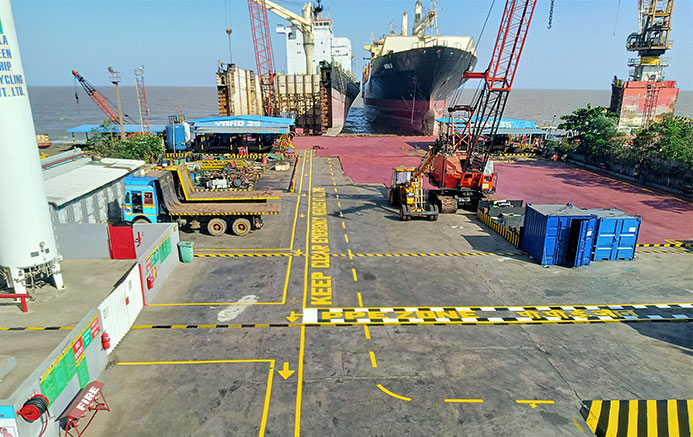Alang Welcomes Three Major Vessels as India Strengthens Ship Recycling Dominance
By shipping inbox Reporter | July 15, 2025
The ship recycling hub of Alang, Gujarat, witnessed a surge in activity last week as three large vessels — collectively weighing nearly 70,000 light displacement tonnes (ldt) — arrived at Indian yards for dismantling. These high-value arrivals reinforce India’s position as a global leader in green ship recycling, particularly under the framework of the Hong Kong International Convention for the Safe and Environmentally Sound Recycling of Ships (HKC).

The latest additions to Alang’s breaking yards include the Inda, a 22-year-old Russian-flagged crude oil tanker with a deadweight tonnage (dwt) of 115,418; the Enterprise, a 4,646 twenty-foot equivalent unit (TEU) container vessel built in the United States in 1980 and owned by Horizon Lines; and Techno, an LNG carrier of 114,000 gross tonnage (gt), built in 1999. These three vessels are expected to keep the yards busy for weeks, if not months, feeding into India’s vast steel and scrap industries while also supporting employment for thousands of skilled and semi-skilled workers.
Despite the seasonal slowdown typically seen during the Indian monsoon, recyclers in India are reporting a healthy work pipeline. Analysts say that India’s established infrastructure and regulatory readiness under the HKC are giving it a significant competitive edge.
According to GMS, the world’s largest cash buyer of end-of-life ships, India currently hosts ten times the number of HKC-approved yards compared to its nearest rivals, Bangladesh and Pakistan. This compliance advantage is particularly critical as shipowners grow increasingly concerned about environmental and social governance (ESG) standards when selecting recycling destinations.
In contrast, Pakistan’s ship recycling industry is mired in regulatory delays and confusion. Despite demand from yard owners, the country still lacks facilities that are compliant with HKC standards. Recycling firms in Pakistan are attempting to obtain Documents of Authorisation for Ship Recycling (DASRs), but increased bureaucratic hurdles and unclear compliance requirements have hampered progress. This has likely deterred many international owners from concluding sales in Pakistan.
Bangladesh, once a price leader in the region, is also struggling. Recycling prices there have dipped below $400 per ldt in some recent deals — a significant decline from the $600 per ton levels observed for container ships in early 2024. While vessels are being offered for potential recycling in Chattogram, GMS notes that many of these sales are made with contingency plans to divert the ships to Indian or Pakistani shores, despite Bangladesh’s proximity advantages.
Pakistan currently tops the regional price table, offering indicative rates of $450 per ldt for container ships, $440 for tankers, and $420 for bulk carriers. India follows closely, typically $10 behind across categories. Meanwhile, Bangladesh trails further at $430, $420, and $410, respectively. Turkey, constrained by geographical distance and limited capacity, offers the lowest theoretical prices at $270, $260, and $250 for container ships, tankers, and bulkers.
Despite Pakistan’s nominal price edge, owners are prioritising regulatory certainty and environmentally sound practices — key strengths of the Indian system. This growing preference is evident in the steady stream of tonnage arriving at Alang.
Industry observers believe that the ongoing disparity in environmental compliance and pricing stability will likely sustain India’s leadership in global ship recycling, particularly as the Hong Kong Convention comes into full force. With over 100 HKC-compliant yards now operational, India is well-positioned to capture a greater share of the market as shipowners and charterers increasingly align with international sustainability norms.
As the global fleet ages and regulations tighten, Alang’s ability to attract high-value tonnage while maintaining its commitment to safety and sustainability is expected to keep the region at the forefront of green recycling in the years ahead.
Author: shipping inbox
shipping and maritime related web portal









